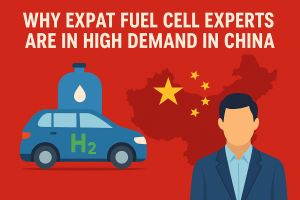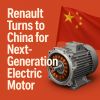China is racing to build the world’s largest hydrogen economy — and it needs help to do it. As Beijing pushes toward its carbon neutrality target for 2060, investment in hydrogen and fuel cell technology is accelerating. But despite its rapid progress, China still faces gaps in technical know-how. This is where expat fuel cell experts come in. Across the country, foreign engineers, scientists, and technical managers are being hired to help Chinese companies bridge those gaps and turn research projects into large-scale commercial solutions.
Rapid Market Growth
China’s hydrogen economy is growing faster than any other in the world. Government subsidies and local pilot programs are targeting fuel cell vehicles (FCVs), particularly heavy-duty trucks, buses, and port vehicles.
In 2024, over 8,000 fuel cell vehicles were deployed in China — the highest annual number yet — with cities like Shanghai, Foshan, and Beijing leading the rollout.
The government’s 2030 target calls for one million FCVs on the road and a fully developed hydrogen supply network.
This aggressive scaling requires expertise that local teams are still developing — creating a huge talent gap.
Where the Expertise Is Needed
Foreign specialists are being hired for several critical areas:
Core Components: Experts in bipolar plates, hydrogen compressors, and precision hydrogen filling systems are helping manufacturers boost stack performance and reduce costs.
Advanced Materials: China is still catching up to global standards for high-grade plastics, membranes, and carbon fiber composites used in fuel cell stacks and hydrogen tanks.
Durability & Reliability: International experts are improving the life cycle of stacks — a key factor for commercial trucks, which require tens of thousands of operational hours.
System Integration: Large-scale projects need foreign engineers with experience designing full fuel cell engine systems, control software, and safety systems.
Commercialization: Many Chinese R&D projects have struggled to leave the lab. Foreign managers are often hired to close this “valley of death” between research and market-ready products.
Knowledge Transfer & Standards
Expat experts are not just filling jobs — they’re training local teams. Roles such as stack durability specialists and fuel cell control engineers are often filled by foreign hires who then build up local knowledge.
International hires are also helping shape industry standards and safety regulations, an area where China is still developing frameworks to align with global markets.
Foreign Players Driving Demand
Global partnerships are further increasing the need for expat talent:
Ballard Power Systems (Canada) has joint ventures in China, supplying fuel cell stacks for commercial vehicles and employing international engineers to oversee production quality.
Bosch and Weichai Power are co-developing fuel cell systems in Shandong Province, with German specialists leading early production phases.
Shell is building hydrogen fueling infrastructure in key cities, bringing in experts to manage station design and safety compliance.
The Bottom Line
For China, importing talent is a fast way to catch up with Japan, South Korea, and Europe in fuel cell technology. For foreign engineers and technical managers, the demand translates into attractive salaries, relocation packages, and opportunities to work on some of the world’s largest hydrogen projects





